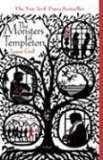Summary | Excerpt | Reading Guide | Reviews | Beyond the Book | Readalikes | Genres & Themes | Author Bio

A Novel
by Lauren Groff
Most of Templeton was watching as the motorboats cut their
engines
and glided in. The Chief Uncas tourist boat groaned in the waves
against the
dock. The Running Buds climbed out with great gravitas, old
joints creaking, and secured the beast's tethers to the iron hitches in the
walls at the lake's edge. And in those brief minutes before the baseball
tourists in town heard of our miracle and came running with their vulgar cameras
and shouts and poses, before the news trucks drove ninety miles per hour from
Oneonta, Utica, Albany, there, in the long, peaceful quiet, we had a few moments
to consider our monster.
In that brief time, we were able to see it in its entirety. The
beast was
huge, a heavy cream color that darkened to lemon in places, and
was floating on its back. It looked like a carp grown enormous, with a carp's
fat belly and round eye, but with a long, articulated neck like a ballet
dancer's, and four finned legs, plump as a frog's. The ropes of the motorboat
had cut into its skin, and the wounds were open to the day, still oozing dark,
thick blood. I stepped forward to touch the beast, then everyone else did. When
I placed my hand upon its belly, I felt its porous skin, its hairs as small and
delicate as the ones on my own arms, but thicker, as if the beast were covered
in peach fuzz. And, though I had expected the early sun to have warmed it, the
monster burned cold, as if its very core was made of the ice some said still
existed at the bottom of our glacial lake.
It was somehow clear, even then, that the monster had been
lonely.
The folds above its eye made the old face look wistful, and it
emanated such a strong sense of solitude that each human standing in the park
that day felt miles from the others, though we were shoulder-to-shoulder,
touching. Later, we would hear that when the divers couldn't reach the bottom of
our lake, they called in deep-sea pods to search for another beast like the one
that surfaced that day. We would hear that, scour as they might, they couldn't
find another beast like ours, only detritus: rusted tractors and plastic buoys,
and even an antique phonograph. They found a yellow-painted phaeton in its
entirety, the bones of a small spaniel inside. They also found dozens of human
skeletons, drowned or dumped corpses, arranged side-by-side in some trick of
current or metaphysics, on a shallow shelf near Kingfisher Tower, beside
Judith's Point.
That morning, before I drew my hand away from the monster, I
felt an overwhelming sadness, a sudden memory of one time in high school when I
slipped to the country club docks at midnight with my friends, and, giggling,
naked, we went into the dark star-stippled water, and swam to the middle of the
lake. We treaded water there in the blackness, all of us fallen silent in the
feeling of swimming in such perfect space. I looked up and began to spin. The
stars streaked circular above me, my body was wrapped in the warm black, my
hands had disappeared, my stomach was no longer, I was only a head, a pair of
eyes. As I touched the beast I remembered how, even on that long-ago night, I
could feel a tremendous thing moving in the depths below me, something vast and
white and singing.
Excerpted from The Monsters of Templeton by Lauren Groff. Copyright (c) 2008 Lauren Groff. All rights reserved. Published by Voice, an imprint of Hyperion.
Your guide toexceptional books
BookBrowse seeks out and recommends the best in contemporary fiction and nonfiction—books that not only engage and entertain but also deepen our understanding of ourselves and the world around us.